Adaptive Leadership: Enhancing Industrial Relations in Organizations
VerifiedAdded on 2022/10/12
|8
|1899
|67
Essay
AI Summary
This essay examines the application of adaptive leadership theory in addressing challenges within industrial relations. It highlights how adaptive leadership enables organizations to adapt to complex business environments by diagnosing, interrupting, and innovating. The essay discusses how adaptive leadership fosters empathy, autonomy, and cooperation among employees, leading to improved industrial relations and a positive working environment. It addresses specific challenges such as negative management attitudes towards unions, collective bargaining complexities, and gender wage disparity, explaining how adaptive leadership promotes transparency, effective communication, and fair treatment. The essay concludes that adaptive leadership enhances organizational dynamics, resolves conflicts, and fosters trust, ultimately contributing to the growth and success of both the organization and its members.
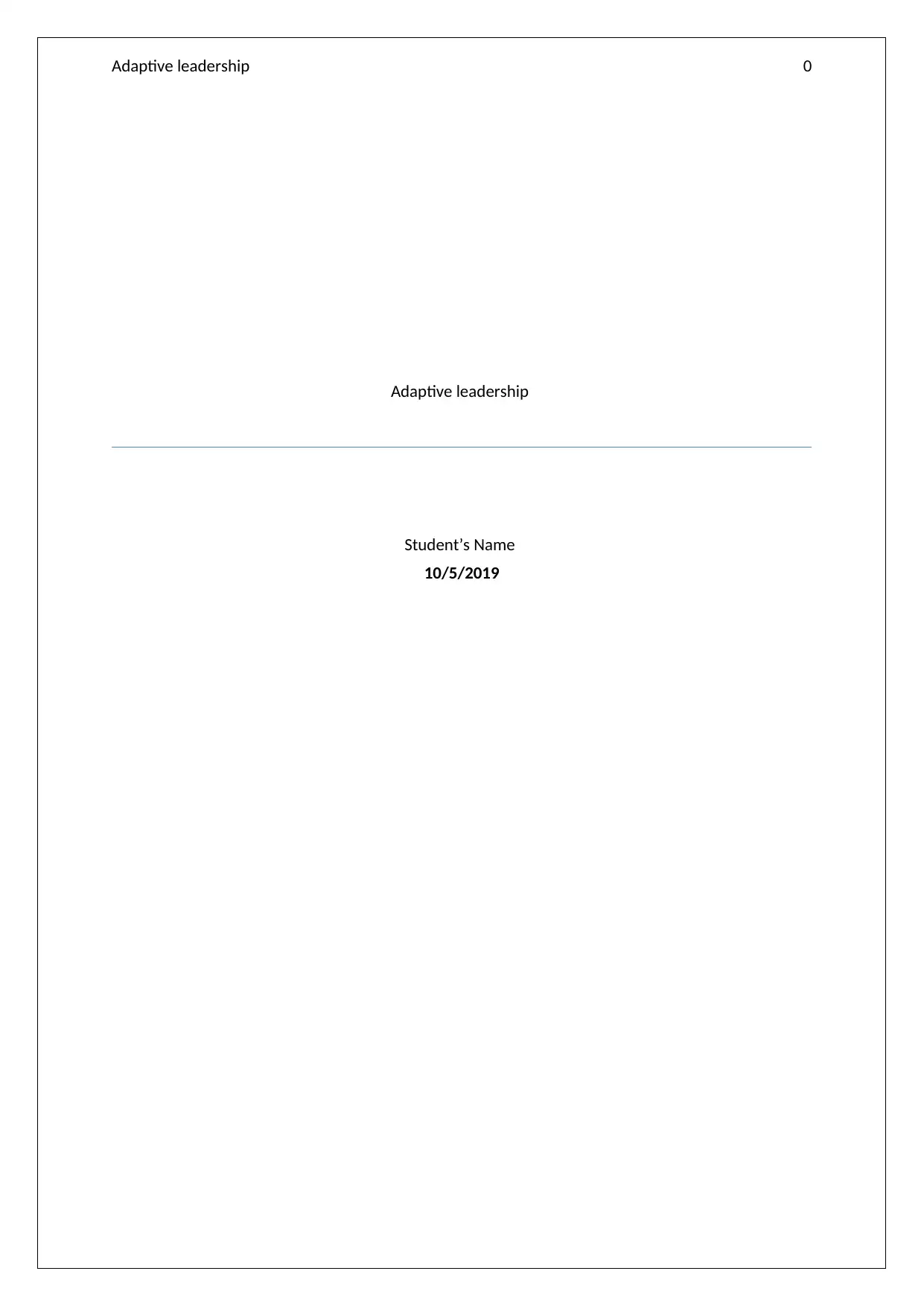
Adaptive leadership 0
Adaptive leadership
Student’s Name
10/5/2019
Adaptive leadership
Student’s Name
10/5/2019
Paraphrase This Document
Need a fresh take? Get an instant paraphrase of this document with our AI Paraphraser
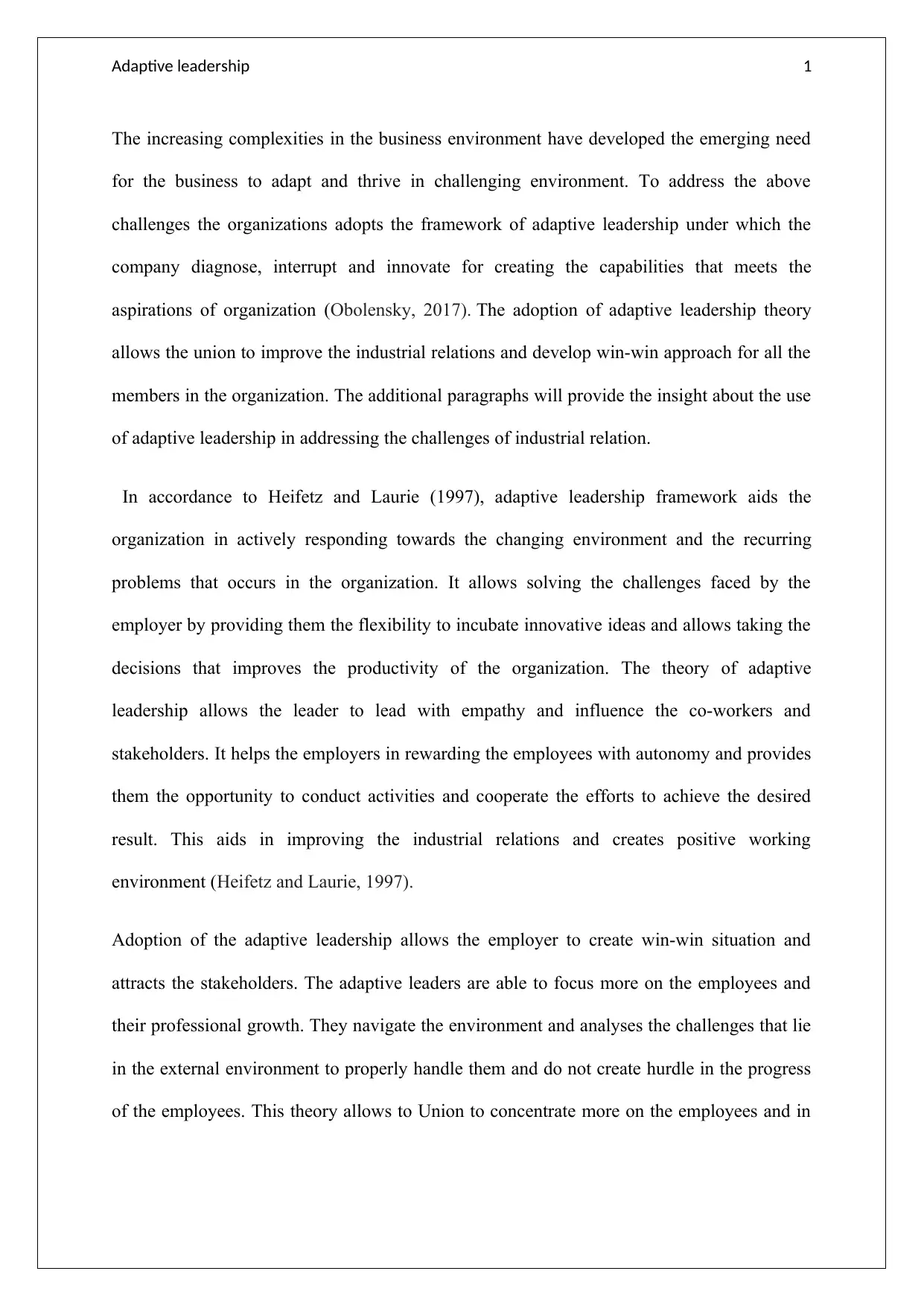
Adaptive leadership 1
The increasing complexities in the business environment have developed the emerging need
for the business to adapt and thrive in challenging environment. To address the above
challenges the organizations adopts the framework of adaptive leadership under which the
company diagnose, interrupt and innovate for creating the capabilities that meets the
aspirations of organization (Obolensky, 2017). The adoption of adaptive leadership theory
allows the union to improve the industrial relations and develop win-win approach for all the
members in the organization. The additional paragraphs will provide the insight about the use
of adaptive leadership in addressing the challenges of industrial relation.
In accordance to Heifetz and Laurie (1997), adaptive leadership framework aids the
organization in actively responding towards the changing environment and the recurring
problems that occurs in the organization. It allows solving the challenges faced by the
employer by providing them the flexibility to incubate innovative ideas and allows taking the
decisions that improves the productivity of the organization. The theory of adaptive
leadership allows the leader to lead with empathy and influence the co-workers and
stakeholders. It helps the employers in rewarding the employees with autonomy and provides
them the opportunity to conduct activities and cooperate the efforts to achieve the desired
result. This aids in improving the industrial relations and creates positive working
environment (Heifetz and Laurie, 1997).
Adoption of the adaptive leadership allows the employer to create win-win situation and
attracts the stakeholders. The adaptive leaders are able to focus more on the employees and
their professional growth. They navigate the environment and analyses the challenges that lie
in the external environment to properly handle them and do not create hurdle in the progress
of the employees. This theory allows to Union to concentrate more on the employees and in
The increasing complexities in the business environment have developed the emerging need
for the business to adapt and thrive in challenging environment. To address the above
challenges the organizations adopts the framework of adaptive leadership under which the
company diagnose, interrupt and innovate for creating the capabilities that meets the
aspirations of organization (Obolensky, 2017). The adoption of adaptive leadership theory
allows the union to improve the industrial relations and develop win-win approach for all the
members in the organization. The additional paragraphs will provide the insight about the use
of adaptive leadership in addressing the challenges of industrial relation.
In accordance to Heifetz and Laurie (1997), adaptive leadership framework aids the
organization in actively responding towards the changing environment and the recurring
problems that occurs in the organization. It allows solving the challenges faced by the
employer by providing them the flexibility to incubate innovative ideas and allows taking the
decisions that improves the productivity of the organization. The theory of adaptive
leadership allows the leader to lead with empathy and influence the co-workers and
stakeholders. It helps the employers in rewarding the employees with autonomy and provides
them the opportunity to conduct activities and cooperate the efforts to achieve the desired
result. This aids in improving the industrial relations and creates positive working
environment (Heifetz and Laurie, 1997).
Adoption of the adaptive leadership allows the employer to create win-win situation and
attracts the stakeholders. The adaptive leaders are able to focus more on the employees and
their professional growth. They navigate the environment and analyses the challenges that lie
in the external environment to properly handle them and do not create hurdle in the progress
of the employees. This theory allows to Union to concentrate more on the employees and in
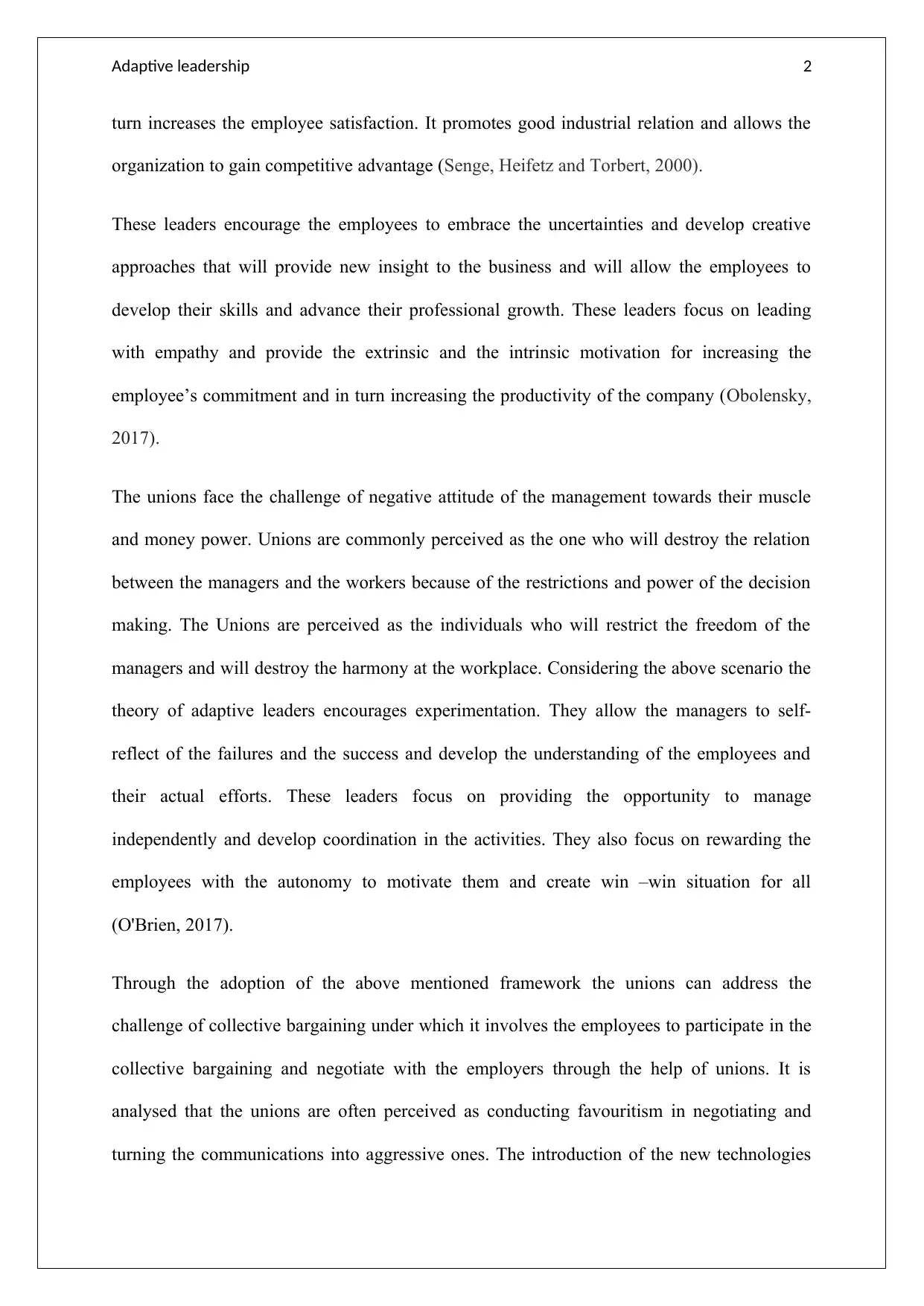
Adaptive leadership 2
turn increases the employee satisfaction. It promotes good industrial relation and allows the
organization to gain competitive advantage (Senge, Heifetz and Torbert, 2000).
These leaders encourage the employees to embrace the uncertainties and develop creative
approaches that will provide new insight to the business and will allow the employees to
develop their skills and advance their professional growth. These leaders focus on leading
with empathy and provide the extrinsic and the intrinsic motivation for increasing the
employee’s commitment and in turn increasing the productivity of the company (Obolensky,
2017).
The unions face the challenge of negative attitude of the management towards their muscle
and money power. Unions are commonly perceived as the one who will destroy the relation
between the managers and the workers because of the restrictions and power of the decision
making. The Unions are perceived as the individuals who will restrict the freedom of the
managers and will destroy the harmony at the workplace. Considering the above scenario the
theory of adaptive leaders encourages experimentation. They allow the managers to self-
reflect of the failures and the success and develop the understanding of the employees and
their actual efforts. These leaders focus on providing the opportunity to manage
independently and develop coordination in the activities. They also focus on rewarding the
employees with the autonomy to motivate them and create win –win situation for all
(O'Brien, 2017).
Through the adoption of the above mentioned framework the unions can address the
challenge of collective bargaining under which it involves the employees to participate in the
collective bargaining and negotiate with the employers through the help of unions. It is
analysed that the unions are often perceived as conducting favouritism in negotiating and
turning the communications into aggressive ones. The introduction of the new technologies
turn increases the employee satisfaction. It promotes good industrial relation and allows the
organization to gain competitive advantage (Senge, Heifetz and Torbert, 2000).
These leaders encourage the employees to embrace the uncertainties and develop creative
approaches that will provide new insight to the business and will allow the employees to
develop their skills and advance their professional growth. These leaders focus on leading
with empathy and provide the extrinsic and the intrinsic motivation for increasing the
employee’s commitment and in turn increasing the productivity of the company (Obolensky,
2017).
The unions face the challenge of negative attitude of the management towards their muscle
and money power. Unions are commonly perceived as the one who will destroy the relation
between the managers and the workers because of the restrictions and power of the decision
making. The Unions are perceived as the individuals who will restrict the freedom of the
managers and will destroy the harmony at the workplace. Considering the above scenario the
theory of adaptive leaders encourages experimentation. They allow the managers to self-
reflect of the failures and the success and develop the understanding of the employees and
their actual efforts. These leaders focus on providing the opportunity to manage
independently and develop coordination in the activities. They also focus on rewarding the
employees with the autonomy to motivate them and create win –win situation for all
(O'Brien, 2017).
Through the adoption of the above mentioned framework the unions can address the
challenge of collective bargaining under which it involves the employees to participate in the
collective bargaining and negotiate with the employers through the help of unions. It is
analysed that the unions are often perceived as conducting favouritism in negotiating and
turning the communications into aggressive ones. The introduction of the new technologies
⊘ This is a preview!⊘
Do you want full access?
Subscribe today to unlock all pages.

Trusted by 1+ million students worldwide
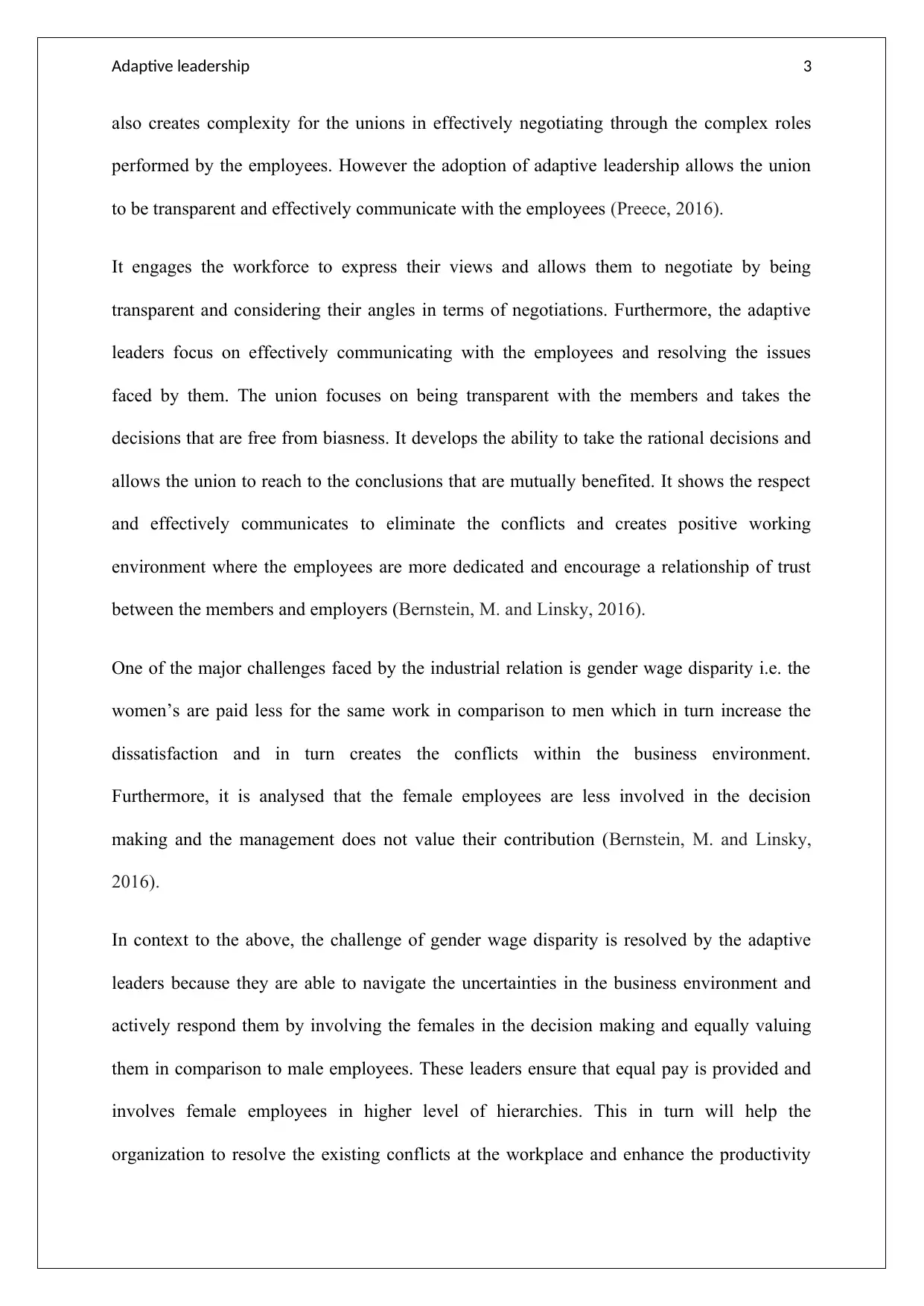
Adaptive leadership 3
also creates complexity for the unions in effectively negotiating through the complex roles
performed by the employees. However the adoption of adaptive leadership allows the union
to be transparent and effectively communicate with the employees (Preece, 2016).
It engages the workforce to express their views and allows them to negotiate by being
transparent and considering their angles in terms of negotiations. Furthermore, the adaptive
leaders focus on effectively communicating with the employees and resolving the issues
faced by them. The union focuses on being transparent with the members and takes the
decisions that are free from biasness. It develops the ability to take the rational decisions and
allows the union to reach to the conclusions that are mutually benefited. It shows the respect
and effectively communicates to eliminate the conflicts and creates positive working
environment where the employees are more dedicated and encourage a relationship of trust
between the members and employers (Bernstein, M. and Linsky, 2016).
One of the major challenges faced by the industrial relation is gender wage disparity i.e. the
women’s are paid less for the same work in comparison to men which in turn increase the
dissatisfaction and in turn creates the conflicts within the business environment.
Furthermore, it is analysed that the female employees are less involved in the decision
making and the management does not value their contribution (Bernstein, M. and Linsky,
2016).
In context to the above, the challenge of gender wage disparity is resolved by the adaptive
leaders because they are able to navigate the uncertainties in the business environment and
actively respond them by involving the females in the decision making and equally valuing
them in comparison to male employees. These leaders ensure that equal pay is provided and
involves female employees in higher level of hierarchies. This in turn will help the
organization to resolve the existing conflicts at the workplace and enhance the productivity
also creates complexity for the unions in effectively negotiating through the complex roles
performed by the employees. However the adoption of adaptive leadership allows the union
to be transparent and effectively communicate with the employees (Preece, 2016).
It engages the workforce to express their views and allows them to negotiate by being
transparent and considering their angles in terms of negotiations. Furthermore, the adaptive
leaders focus on effectively communicating with the employees and resolving the issues
faced by them. The union focuses on being transparent with the members and takes the
decisions that are free from biasness. It develops the ability to take the rational decisions and
allows the union to reach to the conclusions that are mutually benefited. It shows the respect
and effectively communicates to eliminate the conflicts and creates positive working
environment where the employees are more dedicated and encourage a relationship of trust
between the members and employers (Bernstein, M. and Linsky, 2016).
One of the major challenges faced by the industrial relation is gender wage disparity i.e. the
women’s are paid less for the same work in comparison to men which in turn increase the
dissatisfaction and in turn creates the conflicts within the business environment.
Furthermore, it is analysed that the female employees are less involved in the decision
making and the management does not value their contribution (Bernstein, M. and Linsky,
2016).
In context to the above, the challenge of gender wage disparity is resolved by the adaptive
leaders because they are able to navigate the uncertainties in the business environment and
actively respond them by involving the females in the decision making and equally valuing
them in comparison to male employees. These leaders ensure that equal pay is provided and
involves female employees in higher level of hierarchies. This in turn will help the
organization to resolve the existing conflicts at the workplace and enhance the productivity
Paraphrase This Document
Need a fresh take? Get an instant paraphrase of this document with our AI Paraphraser
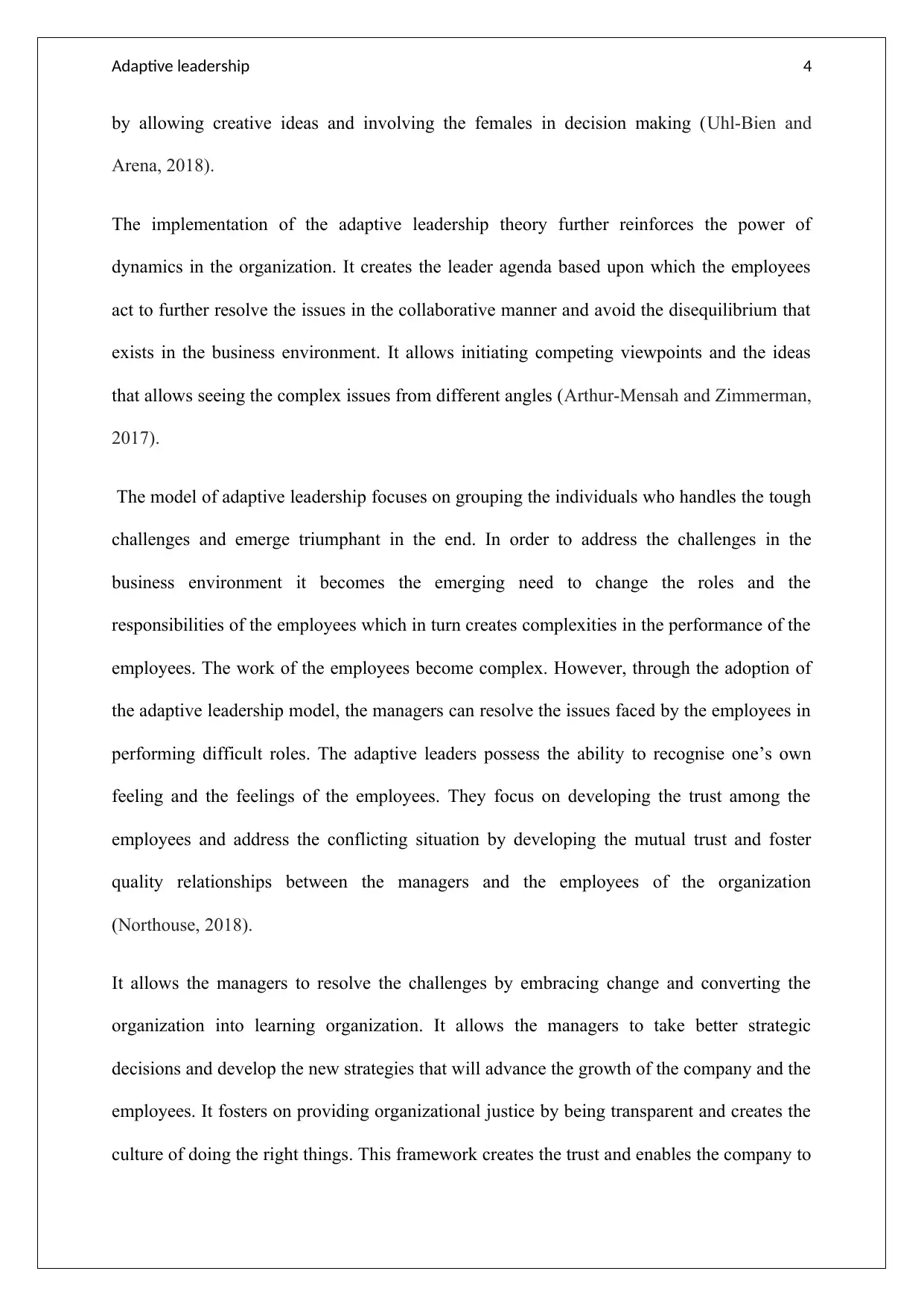
Adaptive leadership 4
by allowing creative ideas and involving the females in decision making (Uhl-Bien and
Arena, 2018).
The implementation of the adaptive leadership theory further reinforces the power of
dynamics in the organization. It creates the leader agenda based upon which the employees
act to further resolve the issues in the collaborative manner and avoid the disequilibrium that
exists in the business environment. It allows initiating competing viewpoints and the ideas
that allows seeing the complex issues from different angles (Arthur-Mensah and Zimmerman,
2017).
The model of adaptive leadership focuses on grouping the individuals who handles the tough
challenges and emerge triumphant in the end. In order to address the challenges in the
business environment it becomes the emerging need to change the roles and the
responsibilities of the employees which in turn creates complexities in the performance of the
employees. The work of the employees become complex. However, through the adoption of
the adaptive leadership model, the managers can resolve the issues faced by the employees in
performing difficult roles. The adaptive leaders possess the ability to recognise one’s own
feeling and the feelings of the employees. They focus on developing the trust among the
employees and address the conflicting situation by developing the mutual trust and foster
quality relationships between the managers and the employees of the organization
(Northouse, 2018).
It allows the managers to resolve the challenges by embracing change and converting the
organization into learning organization. It allows the managers to take better strategic
decisions and develop the new strategies that will advance the growth of the company and the
employees. It fosters on providing organizational justice by being transparent and creates the
culture of doing the right things. This framework creates the trust and enables the company to
by allowing creative ideas and involving the females in decision making (Uhl-Bien and
Arena, 2018).
The implementation of the adaptive leadership theory further reinforces the power of
dynamics in the organization. It creates the leader agenda based upon which the employees
act to further resolve the issues in the collaborative manner and avoid the disequilibrium that
exists in the business environment. It allows initiating competing viewpoints and the ideas
that allows seeing the complex issues from different angles (Arthur-Mensah and Zimmerman,
2017).
The model of adaptive leadership focuses on grouping the individuals who handles the tough
challenges and emerge triumphant in the end. In order to address the challenges in the
business environment it becomes the emerging need to change the roles and the
responsibilities of the employees which in turn creates complexities in the performance of the
employees. The work of the employees become complex. However, through the adoption of
the adaptive leadership model, the managers can resolve the issues faced by the employees in
performing difficult roles. The adaptive leaders possess the ability to recognise one’s own
feeling and the feelings of the employees. They focus on developing the trust among the
employees and address the conflicting situation by developing the mutual trust and foster
quality relationships between the managers and the employees of the organization
(Northouse, 2018).
It allows the managers to resolve the challenges by embracing change and converting the
organization into learning organization. It allows the managers to take better strategic
decisions and develop the new strategies that will advance the growth of the company and the
employees. It fosters on providing organizational justice by being transparent and creates the
culture of doing the right things. This framework creates the trust and enables the company to
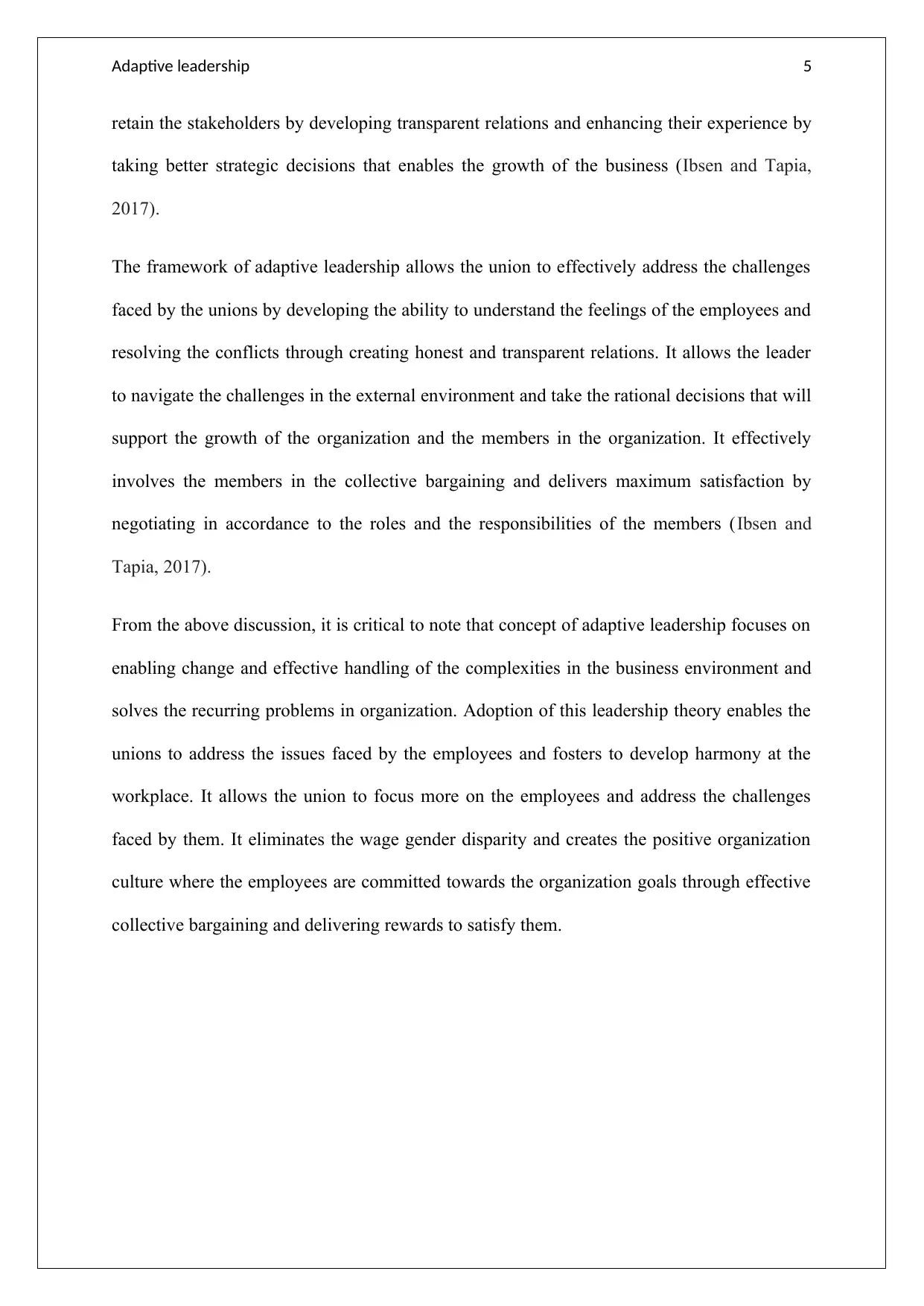
Adaptive leadership 5
retain the stakeholders by developing transparent relations and enhancing their experience by
taking better strategic decisions that enables the growth of the business (Ibsen and Tapia,
2017).
The framework of adaptive leadership allows the union to effectively address the challenges
faced by the unions by developing the ability to understand the feelings of the employees and
resolving the conflicts through creating honest and transparent relations. It allows the leader
to navigate the challenges in the external environment and take the rational decisions that will
support the growth of the organization and the members in the organization. It effectively
involves the members in the collective bargaining and delivers maximum satisfaction by
negotiating in accordance to the roles and the responsibilities of the members (Ibsen and
Tapia, 2017).
From the above discussion, it is critical to note that concept of adaptive leadership focuses on
enabling change and effective handling of the complexities in the business environment and
solves the recurring problems in organization. Adoption of this leadership theory enables the
unions to address the issues faced by the employees and fosters to develop harmony at the
workplace. It allows the union to focus more on the employees and address the challenges
faced by them. It eliminates the wage gender disparity and creates the positive organization
culture where the employees are committed towards the organization goals through effective
collective bargaining and delivering rewards to satisfy them.
retain the stakeholders by developing transparent relations and enhancing their experience by
taking better strategic decisions that enables the growth of the business (Ibsen and Tapia,
2017).
The framework of adaptive leadership allows the union to effectively address the challenges
faced by the unions by developing the ability to understand the feelings of the employees and
resolving the conflicts through creating honest and transparent relations. It allows the leader
to navigate the challenges in the external environment and take the rational decisions that will
support the growth of the organization and the members in the organization. It effectively
involves the members in the collective bargaining and delivers maximum satisfaction by
negotiating in accordance to the roles and the responsibilities of the members (Ibsen and
Tapia, 2017).
From the above discussion, it is critical to note that concept of adaptive leadership focuses on
enabling change and effective handling of the complexities in the business environment and
solves the recurring problems in organization. Adoption of this leadership theory enables the
unions to address the issues faced by the employees and fosters to develop harmony at the
workplace. It allows the union to focus more on the employees and address the challenges
faced by them. It eliminates the wage gender disparity and creates the positive organization
culture where the employees are committed towards the organization goals through effective
collective bargaining and delivering rewards to satisfy them.
⊘ This is a preview!⊘
Do you want full access?
Subscribe today to unlock all pages.

Trusted by 1+ million students worldwide
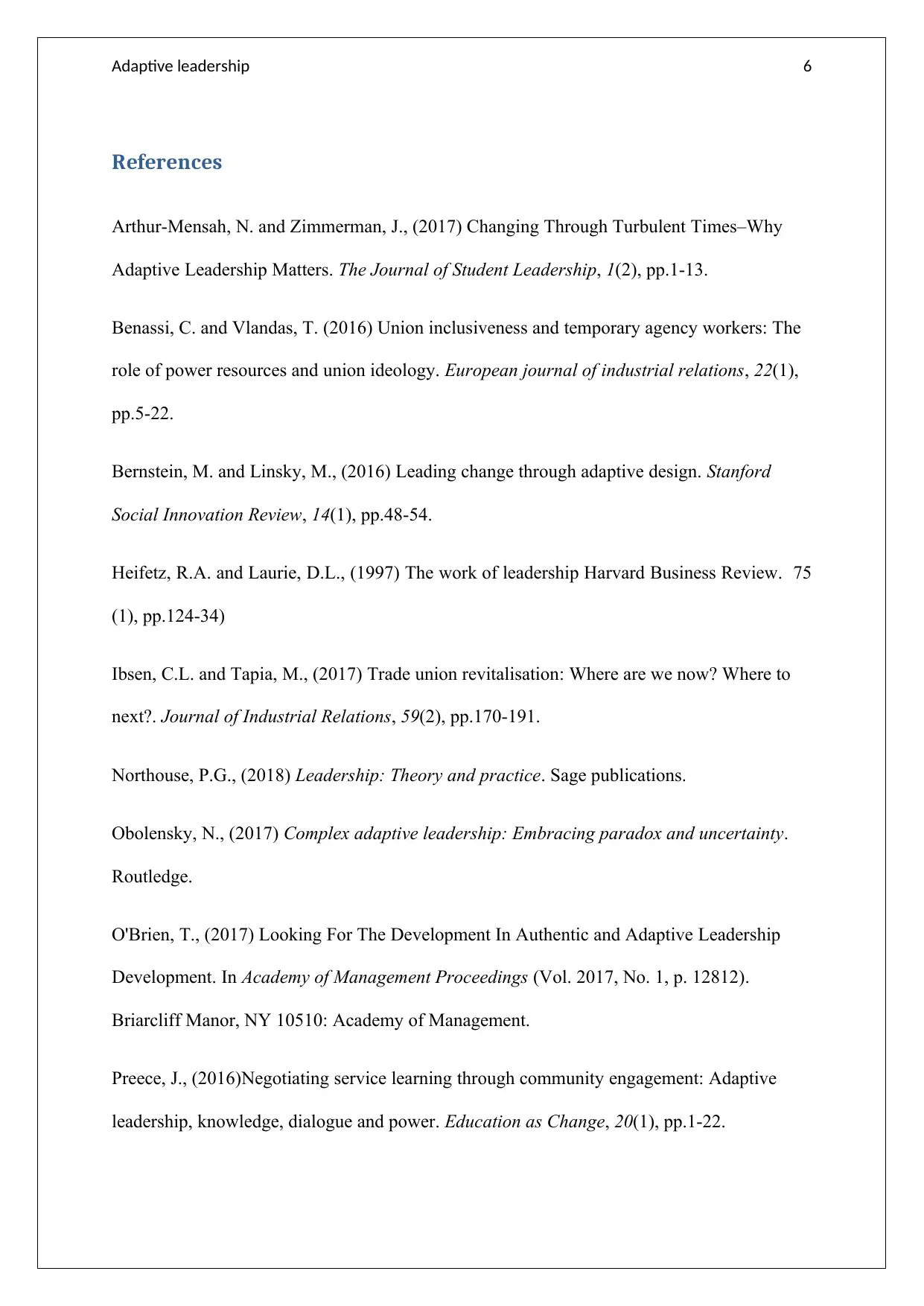
Adaptive leadership 6
References
Arthur-Mensah, N. and Zimmerman, J., (2017) Changing Through Turbulent Times–Why
Adaptive Leadership Matters. The Journal of Student Leadership, 1(2), pp.1-13.
Benassi, C. and Vlandas, T. (2016) Union inclusiveness and temporary agency workers: The
role of power resources and union ideology. European journal of industrial relations, 22(1),
pp.5-22.
Bernstein, M. and Linsky, M., (2016) Leading change through adaptive design. Stanford
Social Innovation Review, 14(1), pp.48-54.
Heifetz, R.A. and Laurie, D.L., (1997) The work of leadership Harvard Business Review. 75
(1), pp.124-34)
Ibsen, C.L. and Tapia, M., (2017) Trade union revitalisation: Where are we now? Where to
next?. Journal of Industrial Relations, 59(2), pp.170-191.
Northouse, P.G., (2018) Leadership: Theory and practice. Sage publications.
Obolensky, N., (2017) Complex adaptive leadership: Embracing paradox and uncertainty.
Routledge.
O'Brien, T., (2017) Looking For The Development In Authentic and Adaptive Leadership
Development. In Academy of Management Proceedings (Vol. 2017, No. 1, p. 12812).
Briarcliff Manor, NY 10510: Academy of Management.
Preece, J., (2016)Negotiating service learning through community engagement: Adaptive
leadership, knowledge, dialogue and power. Education as Change, 20(1), pp.1-22.
References
Arthur-Mensah, N. and Zimmerman, J., (2017) Changing Through Turbulent Times–Why
Adaptive Leadership Matters. The Journal of Student Leadership, 1(2), pp.1-13.
Benassi, C. and Vlandas, T. (2016) Union inclusiveness and temporary agency workers: The
role of power resources and union ideology. European journal of industrial relations, 22(1),
pp.5-22.
Bernstein, M. and Linsky, M., (2016) Leading change through adaptive design. Stanford
Social Innovation Review, 14(1), pp.48-54.
Heifetz, R.A. and Laurie, D.L., (1997) The work of leadership Harvard Business Review. 75
(1), pp.124-34)
Ibsen, C.L. and Tapia, M., (2017) Trade union revitalisation: Where are we now? Where to
next?. Journal of Industrial Relations, 59(2), pp.170-191.
Northouse, P.G., (2018) Leadership: Theory and practice. Sage publications.
Obolensky, N., (2017) Complex adaptive leadership: Embracing paradox and uncertainty.
Routledge.
O'Brien, T., (2017) Looking For The Development In Authentic and Adaptive Leadership
Development. In Academy of Management Proceedings (Vol. 2017, No. 1, p. 12812).
Briarcliff Manor, NY 10510: Academy of Management.
Preece, J., (2016)Negotiating service learning through community engagement: Adaptive
leadership, knowledge, dialogue and power. Education as Change, 20(1), pp.1-22.
Paraphrase This Document
Need a fresh take? Get an instant paraphrase of this document with our AI Paraphraser
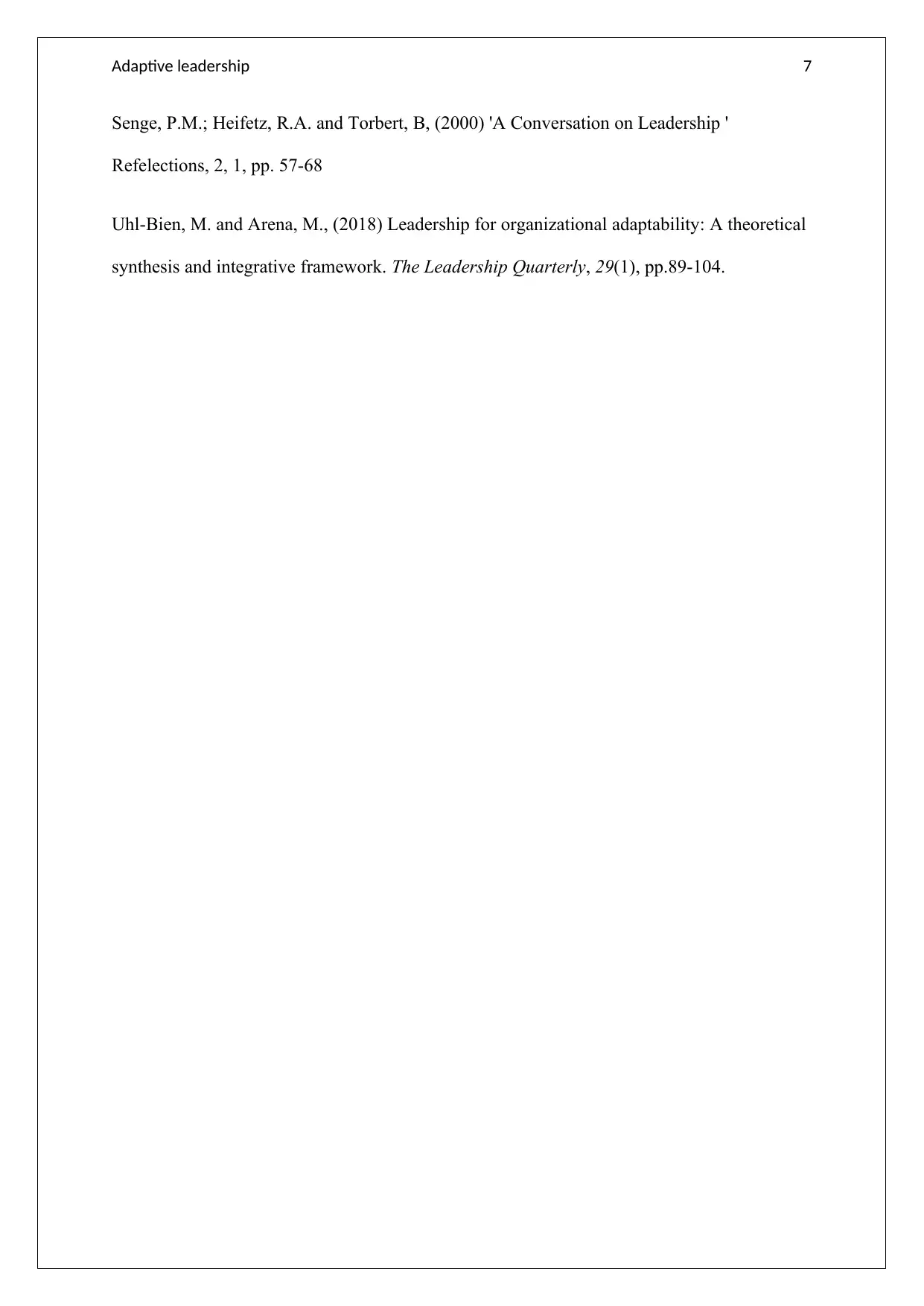
Adaptive leadership 7
Senge, P.M.; Heifetz, R.A. and Torbert, B, (2000) 'A Conversation on Leadership '
Refelections, 2, 1, pp. 57-68
Uhl-Bien, M. and Arena, M., (2018) Leadership for organizational adaptability: A theoretical
synthesis and integrative framework. The Leadership Quarterly, 29(1), pp.89-104.
Senge, P.M.; Heifetz, R.A. and Torbert, B, (2000) 'A Conversation on Leadership '
Refelections, 2, 1, pp. 57-68
Uhl-Bien, M. and Arena, M., (2018) Leadership for organizational adaptability: A theoretical
synthesis and integrative framework. The Leadership Quarterly, 29(1), pp.89-104.
1 out of 8
Related Documents
Your All-in-One AI-Powered Toolkit for Academic Success.
+13062052269
info@desklib.com
Available 24*7 on WhatsApp / Email
![[object Object]](/_next/static/media/star-bottom.7253800d.svg)
Unlock your academic potential
Copyright © 2020–2026 A2Z Services. All Rights Reserved. Developed and managed by ZUCOL.





